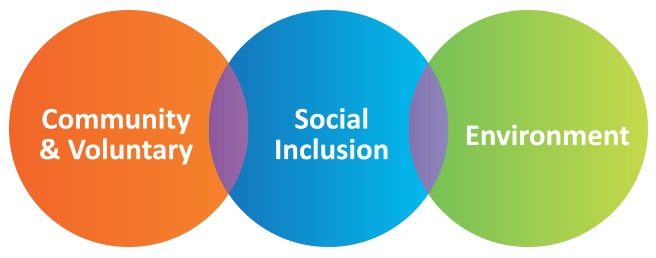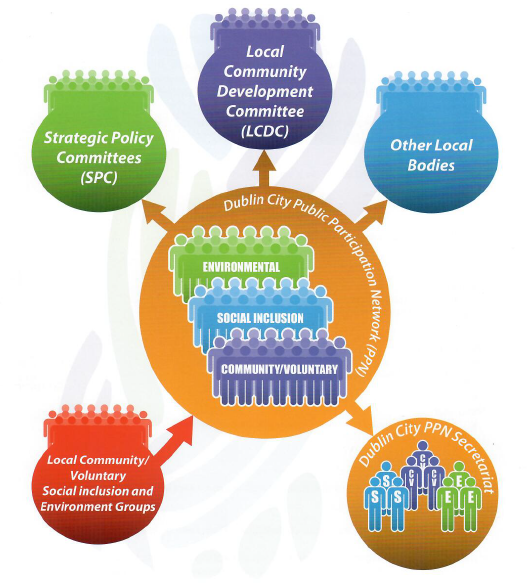How can you influence environmental policy?

13th September 2017
Have you ever wanted your actions on environmental matters to have a greater impact at a local level? You can make a difference for the environment through your Public Participation Network.
There are many people here in Ireland that do a great deal for the environment in their everyday lives, while some have taken their work into the community to set up or join voluntary groups working for a better future. However, even the most beautiful dreams can be dashed when there is no law backing them up, or when damaging policies are created.
Finding your way through the political maze is a daunting prospect, but there is a little-known secret hidden among the hedges, a rose blooming in the form of the Public Participation Networks – PPNs for short. This network has the potential to offer great influence to the average person, and is your pathway to having your ideas heard and achieving real change in the policy of this island.
Each county has a PPN made up of three groups – or Pillars – that focus on social inclusion, community and voluntary, and the environment. By signing up your environmental group to your local PPN, you can receive access to vital information, influence local decision making, and apply for designated funding.
Why join your PPN?
- Access to information – through your PPN you will hear about events, public consultations and training opportunities.
- Influence policy – participate in local decision making. You can make a difference on a political level, whether it’s to influence a positive result or to stop a negative one.
- Funding – You can apply for funding that is available for members of the pillars, such as LEADER and SICAP.
- Communication – The PPNs are a network of voluntary groups. You can use the network to get in touch with others in your county.
Access to Information
Simply sign up your group for free with your local PPN. Any group from the smallest community garden to the largest environmental NGO can request to join. Once your group is signed up you will receive valuable information on subjects such as funding opportunities, public consultations, plan making and policy development. The PPN releases regular e-newsletters, holds workshops and public meetings, and organises consultations on issues which will have an impact on the community.
Influence Policy
The PPN is the main link through which the Council and many other decision-making bodies connect with the local community. It also appoints community representatives to serve on decision-making bodies such as the Local Community Development Committee (LCDC) and Strategic Policy Committees (SPC). You can give as much or as little time as you like, however being involved in your local PPN is a huge opportunity to effect policy change in the council so the more you put in, the greater the outcomes.
Here’s how it works:
- Sign up your group or organisation for free.
- If you wish you can now elect a member of your group on to the Secretariat. They will join other elected members from across the three pillars to perform the work of the secretariat. This work includes communicating between groups, creating the areas Well-Being statement which the PPN will work towards, and developing policies. The work of the secretariat is vital for the functioning of the PPN.
- You can join Linkage Groups. Linkage groups bring together PPN members who have a particular interest on certain issues. Linkage groups act as a bridge between the PPNs and Strategic Policy Committees (SPCs). They advise SPCs, and members of the linkage group can also be elected on to the SPC. Councils rely on SPCs for advice on policy and regulations. All members are invited to join a linkage group and you do not need someone on the secretariat to do so.
- You can be elected to the Local Community Development Committee (LCDC). The LCDC prepares the Local Economic Community Plan (LECP). This plan presents where the community sees itself in the coming years, setting high level goals based on local priorities.
Funding
Once your group is signed up to the PPN, you can apply for funding through the LCDC. The LCDC co-ordinates, plans and oversees local and community development funding (SICAP). They also allocate funding through the LEADER programme. This programme provides funding to rural communities to enable local partners to actively engage and direct the local development in their area through community-led local development.
The PPN is a flat structure, meaning there is no hierarchy. Each group advises and relies on each other, and everyone can have their say. Joining your PPN gives huge potential for change in your area, and for this change to be carried through to a national level. Join your local PPN now and start making a difference!
Communication
You can use the network to get in touch with other groups in your county. Member groups have held great events with the help of the PPN, from collaborative workshops and environmental showcases, to expert submissions for public consultations and the creation of public amenities such as orchards and tree trails. PPNs have also previously helped groups with the logistical aspects of events such as venue hire and advertising.
Find your PPN here. Or contact Catherine at catherine@ien.ie for more info.
[x_author title=”About the Author”]









